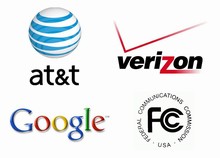Our telecom industry’s overseer doesn’t seem to have any control to stop the greed. That’s because it’s a puppet of the industry giants.
David Rosen and Bruce Kushnick
AlterNet
In a recent AlterNet article, we detailed how the Federal Communications Commission (FCC) helped increase the “FCC Line Charge” (SLC), now capped at $6.50 per line, that is imposed on every residential and business phone line. It is a charge that is usually hidden among the “taxes and surcharges” section of the phone bill. It does not go to fund the FCC, but is a direct subsidy to phone companies.
However, the full story of the role AT&T, Verizon and others played in the FCC’s deliberations establishing the SLC has yet to be told. It is a model of what is known as “regulatory capture,” the process by which a federal or state regulatory or other government agency becomes too cozy with those it is charged to oversee.
In 2000, the phone companies created a campaign known as CALLS (Coalition for Affordable Local and Long Distance Service) to raise fees. It is the model of how these companies, their astroturf shills, co-opted consumer groups, corporate-funded research firms, federal bureaucrats and politicians worked together to effectively take control of the FCC’s agenda and create a massive marketing campaign to fool the public.
A report on the program was issued on September 19, 2000, and mysteriously disappeared from the FCC Web site. It has surfaced and details how the campaign was implemented. It also offers insight into the mystery of regulatory capture that shadows the FCC. A copy of the suppressed report can be found at
Efforts at regulatory capture pioneered by the CALLS program live on. The FCC’s December 21 order on Internet access illustrates how its policies bend to corporate interests. Tim Wu, a Columbia University law professor and the person who coined the term “net neutrality,” reported on how, in a conversation with FCC chairman Julius Genachowski, the chairman insisted the order could only be accepted if AT&T’s interests were met. (And the only commissioners who voted for it were the Democrats.)
Capture is not limited to the FCC. The Department of Interior’s former agency, Minerals Management Service (MMS), served oil and gas industry interests. Exposed in a series of financial and sex scandals, MMS also resisted Congressional officials efforts to investigate safety concerns relating to a second BP platform and other installations setting the stage for the great Gulf oil spill of 2010.
And capture influences American foreign policy as well. A recent WikiLeaks revelation documents how former United States ambassador to France, Craig Stapleton, proposed to “retaliate” against France and the European Union (EU) because of their opposition to Monsanto’s genetically modified seeds.
Today, regulatory capture is business as usual.
RELATED ARTICLE:
7 Mega Cartels That Kill The Free Market and Our Sovereignty


Be the first to comment on "How AT&T, Verizon and the Telecom Giants Have Captured the Regulator Supposed to Control Them"